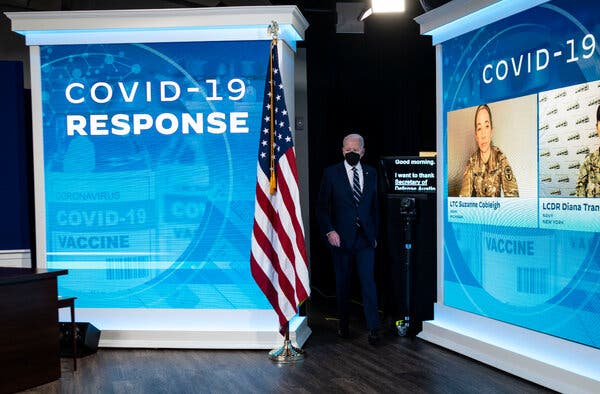The Biden administration, facing calls from public health experts to distribute high-quality masks to the American public, said on Wednesday that it is making 400 million nonsurgical N95 masks available, free of charge, at community health centers and retail pharmacies across the United States.
The move, which officials are calling the “largest deployment of personal protective equipment in U.S. history,” comes just days after the Centers for Disease Control and Prevention updated its mask guidance to acknowledge that cloth masks do not offer as much protection as surgical masks or respirators.
N95 respirators, so named because they can filter out 95 percent of all airborne particles when used correctly, were in short supply early in the pandemic. According to the C.D.C.’s new description of masks, well-fitting respirators, including N95s, offer the highest level of protection.
Wednesday was also the formal launch day for covidtests.gov, the administration’s new website enabling Americans to order at-home coronavirus tests free of charge. The site was quietly rolled out on Tuesday.
The administration has come under intense criticism for not moving sooner to distribute both tests and masks to the public, especially as the Omicron variant fuels a huge spike in cases. Some public health experts have suggested that the federal government should send N95 masks to every household.
Jeff Zients, President Biden’s coronavirus response coordinator, told reporters last week that the administration was “actively exploring” ways to make high-quality masks available.
The White House said in a statement on Wednesday that the government would begin shipping N95 masks to pharmacies and health centers at the end of this week, and that the masks were expected to be available at the end of next week. The program would be in full gear by early February, the statement said.
The masks will come from the Strategic National Stockpile, the nation’s emergency reserve, which was badly depleted at the outset of the pandemic, leaving health care workers without masks and other personal protective gear essential to fighting the novel virus.
An investigation by The New York Times published in March found that for years, the stockpile was heavily weighted toward protecting against bioterror attacks; throughout most of the past decade, nearly half its budget was spent on the anthrax vaccine.
China made half the world’s masks before the coronavirus emerged there, and the country was hoarding them, leaving U.S. hospitals — and the rest of the world — scrambling for supplies. As late as December 2020, the United States was still facing alarming shortages of personal protective gear.
The Biden administration promised to correct those deficiencies. At a Senate hearing last week, Dawn O’Connell, the assistant secretary for preparedness and response at the Department of Health and Human Services, said the stockpile now had 737 million N95 masks, all from domestic manufacturers.
The government is also soliciting proposals from companies that have the ability to surge production to 141 million N95 masks per month in a crisis, and that would be able to maintain manufacturing at a much lower rate when demand is lower, so that the nation would never again be caught short in a public health emergency, Ms. O’Connell said.
The idea, she said, is for the stockpile to “keep this capacity that we currently have going even when demand diminishes.”































